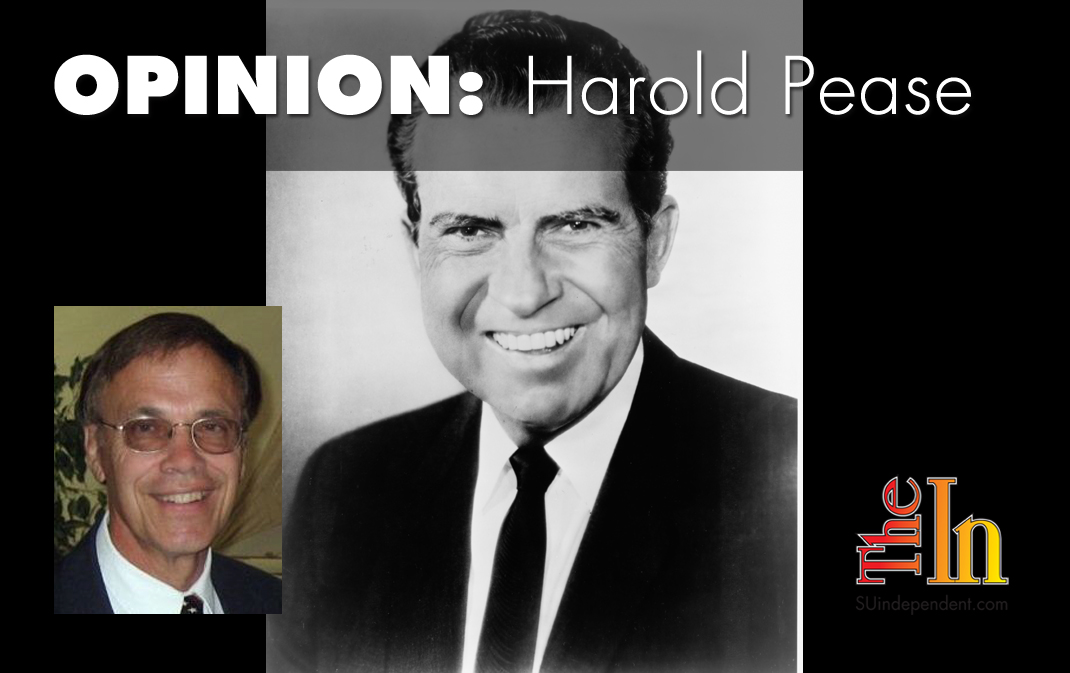
Was Nixon impeached?
By Harold Pease, Ph. D
Most hold that since Richard M. Nixon resigned from office as president before the full House of Representatives could vote on the articles of impeachment, he therefore was not impeached. But they omit the House vote 12 days after he resigned.
There were two votes on impeachment by the full House of Representatives. The first on Feb. 6, 1974, was a vote 410 for and four against, authorizing impeachment proceedings against Nixon that allowed the House Judiciary Committee to begin the formal inquiry. Talk of such had preceded this vote for several months. Thereafter, following six months of House inquiry that did not go well for Nixon, he resigned Aug. 8, 1974, before the full House voted to actually impeach him based on the findings of their Judiciary Committee.
So technically, Nixon was not impeached.
Although he was accused, which is what impeachment is, in the public mind there was no reason to proceed as removal from office was accomplished by Nixon’s resignation.
But wait, that was not the view of the House of Representatives as a second vote was cast to give finality to the long inquiry process. It followed 12 days later, complete with a 528-paged report. According to Wikipedia, “On Aug. 20, the House voted to accept the final Judiciary Committee report by a vote of 412 to 3, with Republican Earl Landgrebe, plus Democrats Otto Passman and Sonny Montgomery casting the only no votes. The 528-page report, published Aug. 22, laid out in detail what it called the ‘clear and convincing evidence’ against Nixon. It also contained a statement from the committee’s Republican members who had originally opposed impeachment, stating for the record that Nixon had not been ‘hounded from office’ but rather had destroyed his own presidency through his patterns of deceit.”
The second vote occurred after the months-long House inquiry and was the final vote of the House of Representatives — no different than any other House vote on impeachment except that Nixon had already resigned.
So Richard Nixon was impeached, meaning charged, just as Andrew Johnson before him and those after.
Donald Trump was not impeached by the House for a month after their vote as they refused to give finality to their work by passing their demand for a trial to the Senate. They had, in effect, dropped the charges. This, of course, subsequently changed when House Managers took their charges to the Senate and Trump, now impeached by the House, was acquitted by the Senate.
With Nixon, they had not finished their work because the full House had not voted, which happened Aug. 20, 1974, after his resignation. In this case, there was no need to try Nixon on the accusations in the Senate as he had already accomplished what a Senate conviction would: his removal from office.
So why are so many still ignorant of the Nixon impeachment vote, even college professors?
Primarily because with Nixon removing himself, the issue went away, and the nation, so hurt by the Watergate Scandal, wanted to forget it. Consequently, The New York Times covered (but buried) this previously headlined story on page 22.
It read: “Without a trace of fanfare or drama and without a word of debate, the impeachment inquiry by the House of Representatives formally ended today. It ended as it had begun 10 months ago. First, there was a private agreement among leaders of both parties about how to proceed. Then, the action was taken in the tried and true parliamentary language that the House uses day after day to conduct routine business.
“At 1:50 P.M., Representative Peter W. Rodino Jr., chairman of the House Judiciary Committee, rose on the House floor and announced, ‘Mr. Speaker, I submit a privileged report pursuant to House Resolution 803.’ That resolution had given the committee the right to act as an agent of the House, with all of the House’s constitutional authority, in investigating whether. former, President Richard M. Nixon should be impeached. The Speaker of the House, Representative Carl Albert, responded in the same words and the same barely audible voice that he has used hundreds of other times when committee chairmen filed routine reports….”
“But this report is not routine,” The NY Times continued, “Running about 200,000 words, it sets out the evidence that the Judiciary Committee found warranted Mr. Nixon’s impeachment, and removal from office. Had Mr. Nixon not resigned, this document would have formed the basis for the first House impeachment debate in more than a century.…”
“It is Important,” Representative Robert W. Kastenmeier of Wisconsin, a ranking Democrat on the committee, said afterward, and this is a major point, that “the impeachment matter not seem unresolved. Representative Thomas P. O’Neill Jr. of Massachusetts, the Democratic leader, offered a resolution commending the judiciary committee for its work and accepting its report.”
“Representative John J. Rhodes of Arizona, the, Republican leader, took the necessary parliamentary step of demanding a second, and, without debate, the resolution was approved by a vote of 412 to 3.”
So Nixon was impeached by a vote of 412 to 3. The populous can be excused for their ignorance. But college professors, fact-checking services, news reporters, journalists, and historians cannot.
The viewpoints expressed above are those of the author and do not necessarily reflect those of The Independent.
How to submit an article, guest opinion piece, or letter to the editor to The Independent
Do you have something to say? Want your voice to be heard by thousands of readers? Send The Independent your letter to the editor or guest opinion piece. All submissions will be considered for publication by our editorial staff. If your letter or editorial is accepted, it will run on suindependent.com, and we’ll promote it through all of our social media channels. We may even decide to include it in our monthly print edition. Just follow our simple submission guidelines and make your voice heard:
—Submissions should be between 300 and 1,500 words.
—Submissions must be sent to editor@infowest.com as a .doc, .docx, .txt, or .rtf file.
—The subject line of the email containing your submission should read “Letter to the editor.”
—Attach your name to both the email and the document file (we don’t run anonymous letters).
—If you have a photo or image you’d like us to use and it’s in .jpg format, at least 1200 X 754 pixels large, and your intellectual property (you own the copyright), feel free to attach it as well, though we reserve the right to choose a different image.
—If you are on Twitter and would like a shout-out when your piece or letter is published, include that in your correspondence and we’ll give you a mention at the time of publication.



